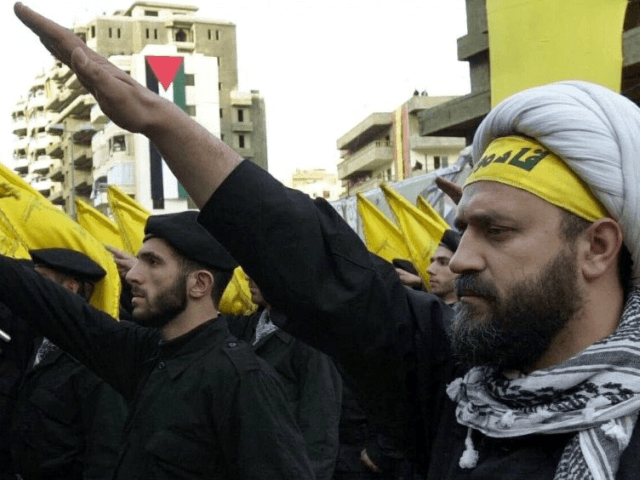Multiple Arabic and Israeli news organization reported on Wednesday that the Shiite terrorist organization Hezbollah has isolated its senior leaders after coming into contact with Iranian government officials carrying Chinese coronavirus.
Among those said to be in self-quarantine is Hassan Nasrallah, the head of Hezbollah. The reports have fueled online rumors that the Hezbollah chief himself has the Wuhan virus, which has spread to thousands throughout Iran, Iraq, and the Gulf states.
At least 23 members of Iran’s Parliament have tested positive for the Chinese virus, which first surfaced in Iran in the city of Qom. Tehran has also confirmed other senior leaders, including a vice president and the man initially tapped to run Iran’s coronavirus response, have tested positive for the virus. Several senior officials have also died, including former ambassador to Syria Hossein Sheikholeslam and senior military officer Mohammed Haj Abolghasemi.
Israel’s i24 News cited Saudi Arabia’s al-Arabiya news agency on Wednesday as initially reporting the safety measures Hezbollah leaders reportedly implemented.
“The Hezbollah members were reportedly infected with the highly transmissible contagion after coming into contact with affected Iranian military officials during a meeting in Beirut last week.,” i24 reported. “Hassan Nasrallah, leader of the Lebanese terrorist organization, is also said to be in isolation as a precaution, although conflicting reports suggest his condition remains unclear.”
Hezbollah, which also operates as a political party in Lebanon, has reportedly begun attempting to trace people who came into contact with confirmed coronavirus carriers from Iran in cities like Beirut and allegedly set up “isolation camps.”
Israel’s Channel 13 reported similarly that Hezbollah had forced senior officials into quarantine because of potential exposure in meetings with Iranian officials.
On social media, Arabic reports began hinting at the possibility that Nasrallah is a coronavirus carrier. At 59 years old, Nasrallah is an at-risk patient to develop a severe infection if carrying the virus. Doctors have observed that seniors, the immunocompromised, and individuals with pre-existing medical conditions are significantly more likely to develop pneumonia as a result of coronavirus infection and die. No major news agency has confirmed the rumors, however, and Hezbollah has failed to confirm or deny them.
Reports have not clarified how senior Hezbollah members would access coronavirus testing and subsequent health care, given their status as international terrorists. The Iranian government, which subsidizes Hezbollah, claimed in February to have begun manufacturing homemade coronavirus testing kits, which it may offer to Hezbollah. Neither the World Health Organization (WHO) nor other international medical bodies have confirmed the accuracy of these tests.
The novel coronavirus first surfaced in Wuhan, central China, in December; China waited to make the discovery of the new virus public until January 20, allowing the public to continue engaging in ways that help facilitate viral infections. It has since infected over 110,000 people globally; Iran is among the most severely affected.
Iran has incorporated its jihadist infrastructure heavily into its response to the outbreak. The Islamic Revolutionary Guard Corps (IRGC), a U.S.-designated terrorist organization, announced last week that its terrorists are working on developing a coronavirus vaccine, a claim Tehran did not corroborate with any explanation of which military leaders in the group had the expertise to conduct medical research. The IRGC is also working to turn military barracks into isolation wards for potential coronavirus patients as they wait for testing results, engaged in contact tracing, and reportedly helping with sanitation measures.
The Islamic regime in Iran first responded to the outbreak in a dismissive fashion. Supreme Leader Ayatollah Ali Khamenei assured the nation in a speech last week that the virus was “not such a big tragedy” as global media had suggested and that Iran had contained the spread of the disease in Qom. A week later, Khamenei, age 80, announced he would cancel his annual new year’s speech and visit to the city of Mashhad on the advice of his doctors to avoid contracting coronavirus from someone attending the address.
President Hassan Rouhani contradicted Khamenei’s lack of concern last week in remarks Wednesday, insisting that “the entire government is playing a role in the committee. There is no individual in our administration that is not engaged.”
“Our effort is focused on making people’s lives, which are currently difficult, easier and more tolerable,” Rouhani said, emphasizing that the outbreak was severe enough to require the attention of every possible government agency.
Iranian officials and political personalities have publicly speculated that the Chinese coronavirus is a biological weapon unleashed on Iran and China to destroy their economies. Some have accused unnamed “hostile forces” for the alleged biological attack; others have openly blamed “Zionists,” a term typically referring to Israeli officials. Mahmoud Ahmadinejad, Rouhani’s predecessor as president, published an open letter to the WHO demanding that the United Nations organization “identify the laboratory” responsible for creating the pathogen, leaving no room for the possibility that the virus, as scientists have amply documented viruses doing, naturally jumped from another animal to a human.

COMMENTS
Please let us know if you're having issues with commenting.